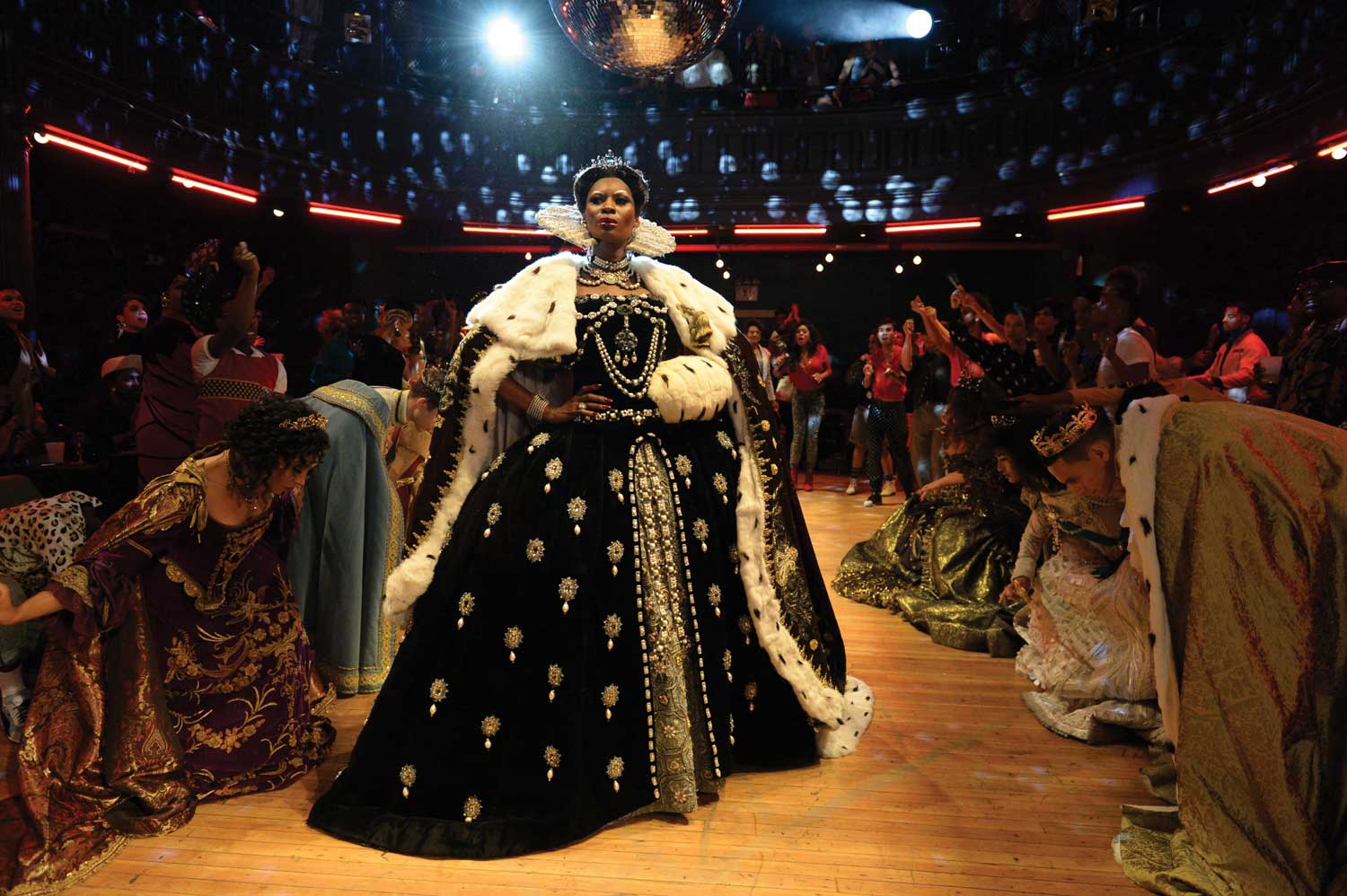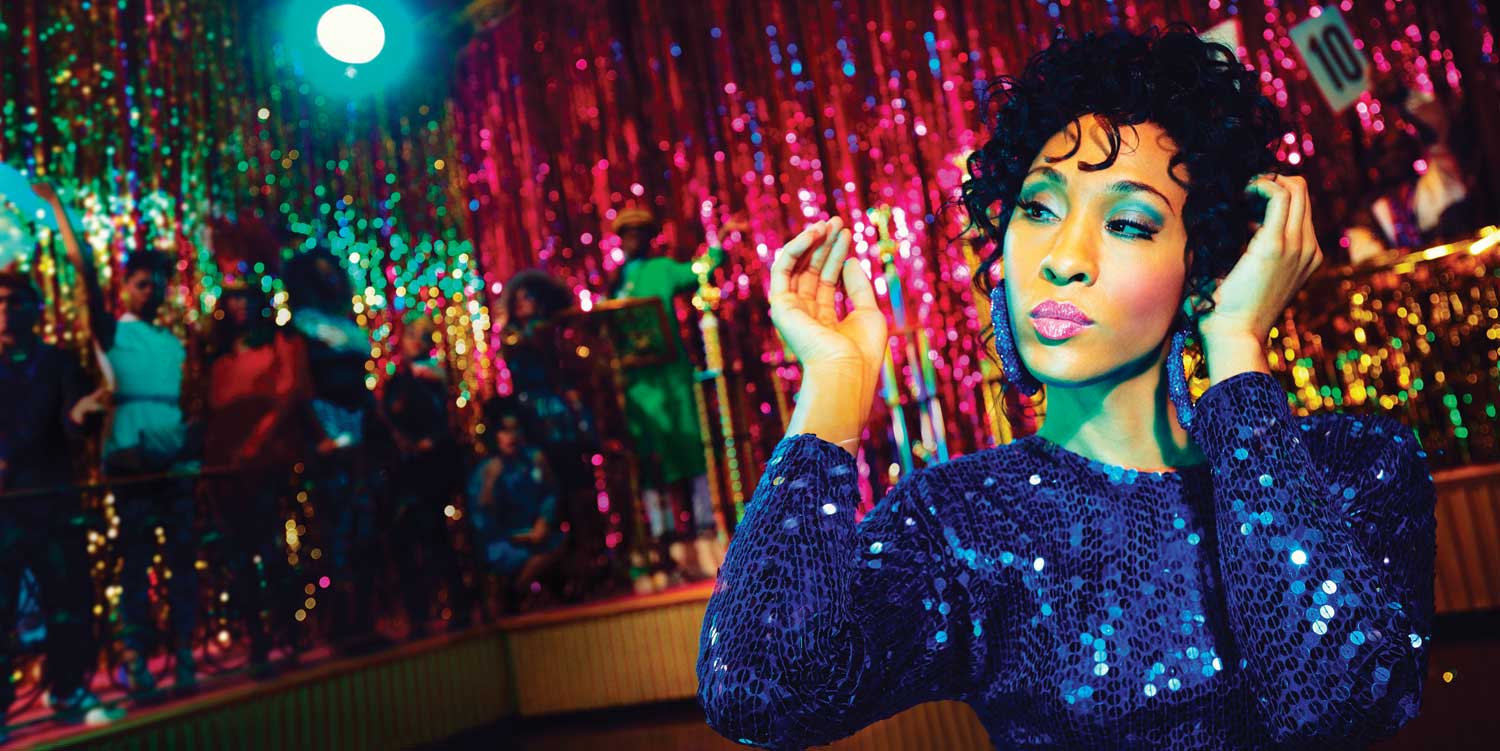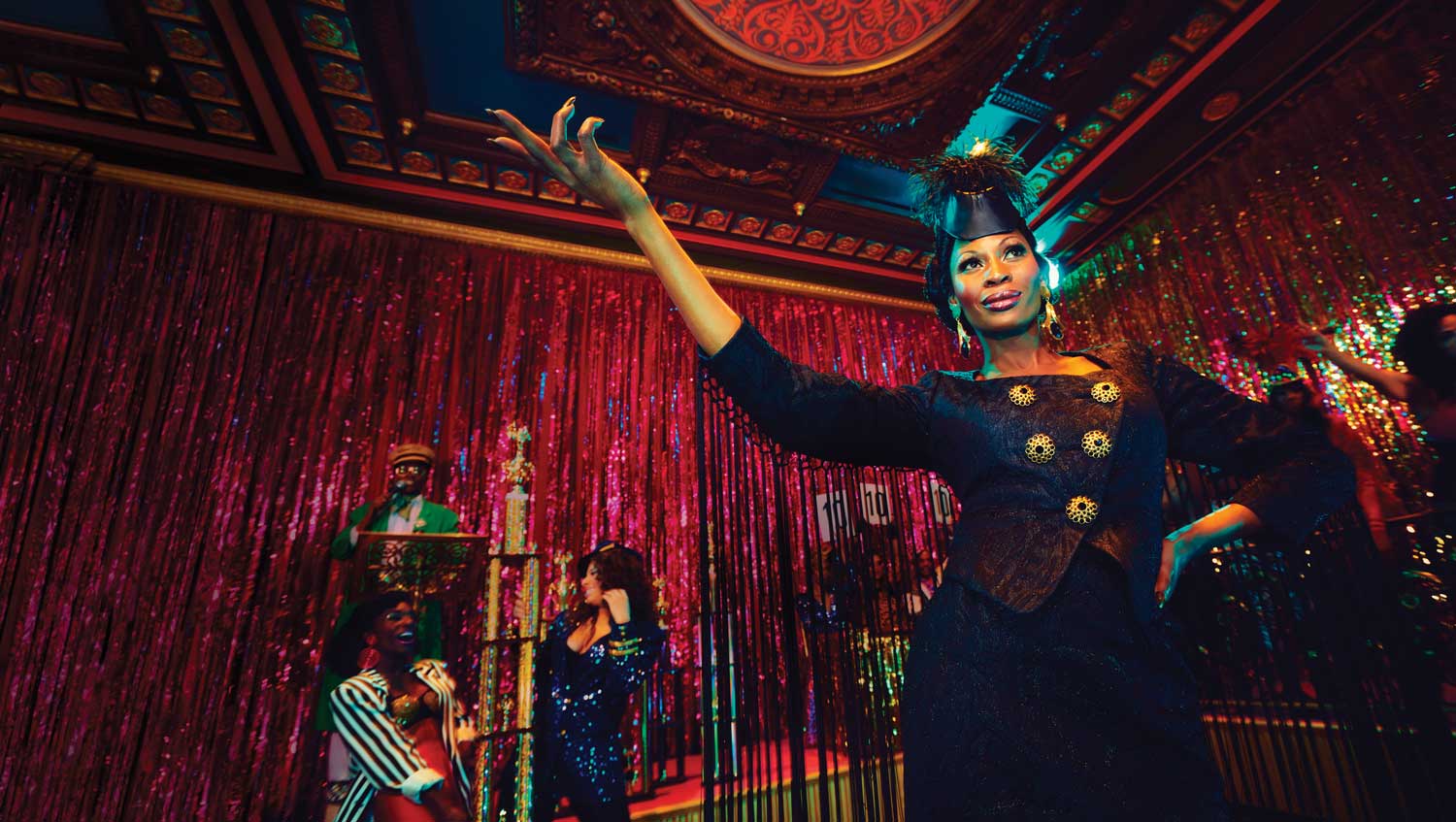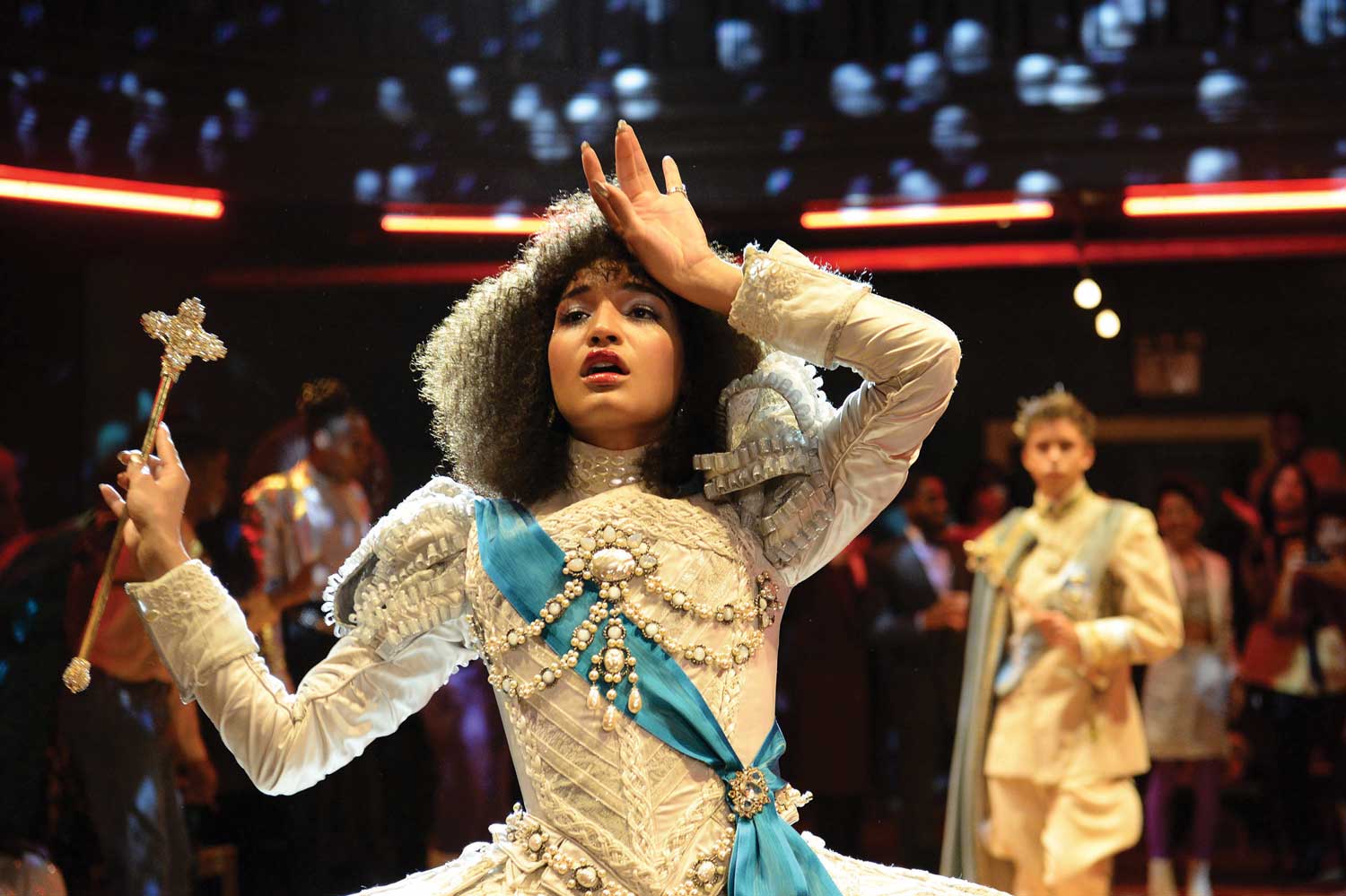HAVING A BALL
& Serving Realness
~ by joel martens ~

“Strike a pose…” Everyone who had any awareness of the ‘90s pop world knows the iconic song “Vogue “ from Madonna’s album, I’m Breathless. But, most probably don’t know that “The Material Girl” took her inspiration for the song from Harlem’s ‘80s “House Ball” community and Jose Gutierez Xtravaganza and Luis Xtravaganza, two of the more famous vogue dancers and choreographers.
“Ball culture,” which began in Harlem more than 50 years ago, has roots as far back as the ‘20s or ‘30s in events consisting primarily of white men competing in fashion shows in local N.Y.C. bars two or three times a year. Though Langston Hughes described Harlem’s mostly Black ,1920s Hamilton Club Lodge Ball as the “Strangest and gaudiest of all Harlem spectacles… where men dress as women and women dress as men.”
Resistance, non-conformity, and defiance around traditional gender norms are the common threads that run through its subculture, though the powerful undercurrent of race and civil rights are ubiquitous to it as well. In modern ball culture, “houses” compete against one another and are judged on dance skills (voguing), costumes, appearance, and attitude based on categories posed. Houses, typically headed by “mothers” and/or “fathers,” who care for their “children” often represent the only safe space that many gay, gender nonconforming and trans youth have ever known. It’s also one of the few welcoming, non-critical spaces for queer youth of color, Blacks and Latinos/Latinas, to express themselves freely.
New York’s Stonewall Riots represented a turning point not only for the larger LGBT community, but also for the colored queer culture and those who participated in the ball world. It was a catalyst that changed the guilty weight of societal judgement to feelings of self-acceptance and pride. No longer would we apologize.

Because of that ideological shift, the ‘70s and ‘80s saw an expansion of queer culture as well as ball participation, expanding well beyond New York, with houses existing across the United States and in over 15 cities.
The new FX Network show POSE, created by Ryan Murphy, Brad Falchuk, and Steven Canals takes a moving picture of that world, showing us the ins and outs of life in the mid-‘80s at the same time stark and unforgiving, yet filled with beauty and indulgence. It was also the moment when the LGBTQ community was battling the AIDS crisis and the series boldly “tells it like it is,” in painful, raw moments that were almost too vivid to watch.
Gritty and at the same time beautiful, the series opens a door into a world that many have never gazed upon. It illustrates the devastation of homophobia, rejection and loss, while at the same time managing to communicate the humanity and sense of home and family we in the LGBT community often create for ourselves.
Creator Steven Canals took a moment to chat with us about the powerful series and how it all came to be.
Tell us about how you came to create the concept and storyline for POSE.
The kernel of the idea for POSE began in 2004. I was an undergrad in college and was studying cinema at Binghamton University. I had a professor who introduced me to the ball world by screening Paris is Burning and fell in love with the community. And, it all happened right around the same time that I was stepping into my queer identity.
I grew up in New York City, in the Bronx and my parents were raised in Harlem. To discover the ball world in my early 20’s, that it had existed for decades, and to know it was right around the corner from where my parents were raised, really blew my mind. It also broke my heart because by that point—we’re talking about the early 2000s, so many people were now dead—specifically the ones who were in Paris is Burning. To have the experience of seeing this community, its power and the incredible fortitude it took to walk unapologetically in 1980s New York, stunned me.
It was such a powerful time of change, socially and politically and I’m grateful to see well-done representation happening. I’m curious, how long was POSE in development?
Just like every other young gay boy, I loved Flash Dance, so I came up with the idea of this young boy named Damon who moves to New York and wants to become a dancer and then gets in the ball culture. I thought it would be an interesting show and literally thought, “That’s an interesting idea, I hope someone actually decides to make that show.”
Then I fell into education, worked as a college administrator for the better part of my 20’s and then early part of my 30’s. I bounced around a couple of different colleges and then finally, after turning 30, I had this moment of real reflection with myself that I had to do something else. I just knew that I couldn’t continue to be a fraud and tell students how to live their best lives, when I wasn’t doing that myself. So I moved to L.A. at 32 and to make a very long story short, I entered UCLA’s M.F.A. screenwriting program.
My second year in the program, I took a drama pilot course and decided the idea that I had come up with literally 10 years earlier, might work and thought, “I should just drop that off and let’s see what happens.”
I wrote that original pilot, POSE, at UCLA and for a better part of about a year and a half, maybe two years, was going in and out of rooms with executives, pitching it.
They really liked my writing and thought that the ball world and the characters were interesting, but no one was really interested in putting actual money behind it.
More often than not, questions from execs would say, “I think this project is too niche” and “I don’t know who the audience for this is” or “I don’t know where a show like this will live.” It wasn’t until I met one of our executive producers, Sherry Marsh, who said, “I absolutely see value in this story so let’s tell that story together,” and she eventually introduced me to Ryan Murphy.
The thing that I find so lovely about POSE is that it reflects this difficult yet wonderful, magical time when you’re discovering who you are, that there is a larger community out there and how grounding that process becomes for LGBTQ people. That story of seeking and discovery doesn’t get told often enough.
I love that you touched upon that because one of the things that Ryan Murphy, Brad Falchuk and I talked about when we were constructing the pilot, first eight episodes and mapping out the first season. We wanted this to be at its core a story about family, that really and truly is what POSE is.
A lot of folks are going to look at our show and want to put it in a very particular box: That’s the ball show or that’s the trans show, or that’s the show about queer black and brown people. When, at the end of the day, it’s about much more than that. It’s a large part of the engine of the show, obviously, going into the balls and touching upon what was happening socio-politically in New York City in the 1980s. But at its core, this show is truly about family, it’s aspirational and a show about resilience.
It’s all about transformations and finding your place in the world. Something many of us in the LGBTQ community have had to do, and often not by choice.
At the end of the day the narrative that we are telling, isn’t that revolutionary. We’re telling stories about hope and having aspirations and joy, it’s just the lens with which we now are telling these stories has shifted. As opposed to having them be about the majority, we are focusing on a marginalized community and I think that is what’s been so interesting for our audience. The idea that we’re actually so much more alike than we are different.

One of the things I’m thrilled to see in modern storytelling around the LGBTQ community, is that it’s not focused on tragedy. There are terrible things that do happen, but that’s not what defines who we are. Was that a part of your idea when you started out?
Yes, especially when I started working with Ryan. My storytelling sensibility tends to lean a little darker, the first draft of POSE was very dark. Ryan came in and said, “We need to think about how to make this narrative more accessible and more universal.” The thing that Ryan said that really resonated deeply and I’ll take this with me for the rest of my career, is “If you want the community that is the most important to you to be seen in the most positive light, then infuse the work with that positivity.” That was the shift that I needed.
As a storyteller, I want narratives to be real and to be truthful. I’m looking for that honesty and that authenticity. My mind set was, “I’m gonna give them the dark gritty version of what it meant as someone who grew up in the Bronx and in the projects.” I wanted people to watch these episodes and to literally smell what New York smelled like in the ‘80s… gritty and dirty.
I realized later, there’s a way for us to tell the truth about what was happening and still show this community in a positive light. It doesn’t have to be morose, there can be levity and you can infuse the narrative with humor and with joy. The audience is still going to be moved and is still going to see the truth of what was happening.
You’re doing it with the specter of the HIV/AIDS crisis looming as well. It was especially poignant to me because that was when I was coming into my own as a gay man, right in the middle of the AIDS crisis. There’s a line that Billy Porter says, “They want us dead.” That’s the first time I’ve actually heard someone vocalize what I felt at the time so matter-of-factly.
I think there are two things that are happening, represented by Blanca’s diagnosis. One, we didn’t want to be didactive, but we certainly wanted to educate the community and our younger viewers because history is important, and we wanted the viewers to know that it really wasn’t that long ago. What we are reflecting on, what it was like for us as a community, is really only 30 years back. The other important piece to that narrative, to Blanca’s status, is letting the audience know that HIV/AIDS does not have to be a death sentence.

This goes back to what you were saying about LGBTQ narratives, the perspective with which our stories are told. We’re dealing with poverty, we’re dealing with violence, we’re dealing with disease, it’s always through that lens. We wanted to show specifically that arc and with that thread as Blanca finds she’s HIV positive and uses it as a catalyst to live her most authentic life. It was important for us to tell that story and let the audience know that there’s still more life to live.
I really want to highlight the fact that you had such an strong trans representation and that the actors are so wonderfully cast. Can you talk a bit about what the casting process was like and how you make those choices?
We have a wonderful casting director, Alexa Fogel. She worked on The Wire and The Ozark. She spent six months with her team going out into the ball community and knows where all the raw talent is. She presented Ryan and Brad and I with all these incredible actors to inhabit these roles.
We watched folks on tape and then met with a bunch of the actors here in New York and heard their personal stories. Through the process of meeting with all of them and seeing how much talent there was, we ended up going back to the pilot and creating new roles. We added characters, just so we could hire more actors for the show, we just couldn’t let them go. It was a really wonderful experience.
It’s kind of a cliché question, but is there anything specific or personal that you hope people get from the series?
I love that question. Quite simply, I just hope the audience will recognize the beauty and the breadth of both the trans and queer experience. That to be LGBTQ or to be black or Latinx, we are not just a monolith. At the end of the day we all want the same thing, to be accepted, we want to be loved and we want to be affirmed for who we are.
POSE is currently running on the FX Network.
For more information, go to fxnetworks.com/shows/pose.